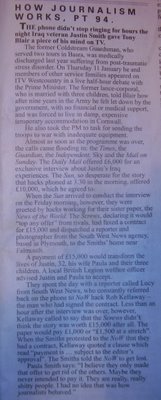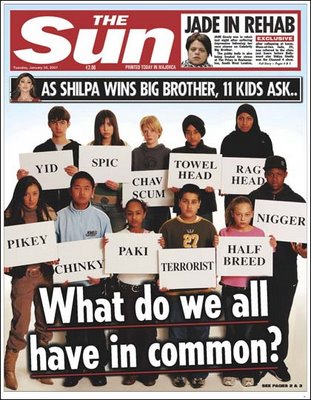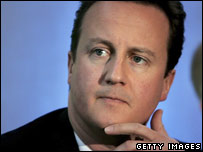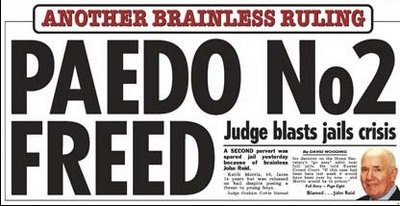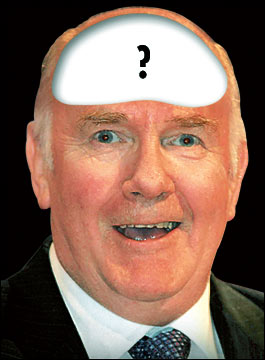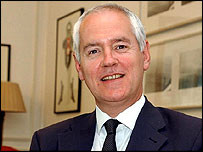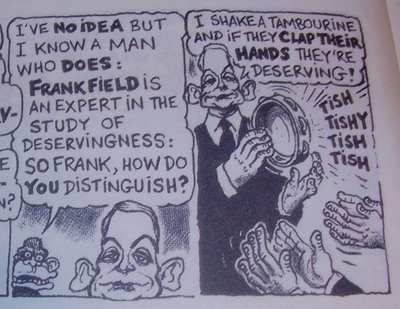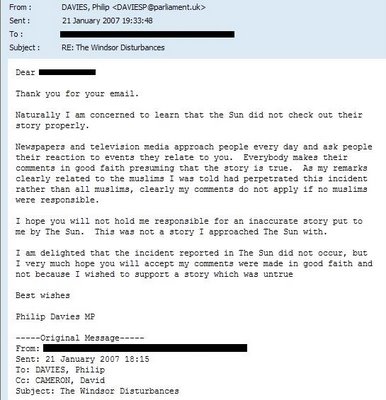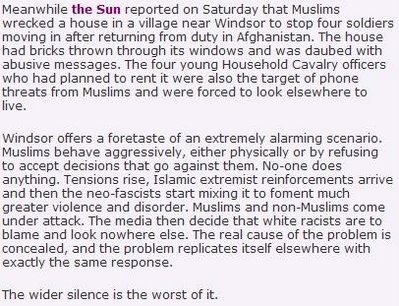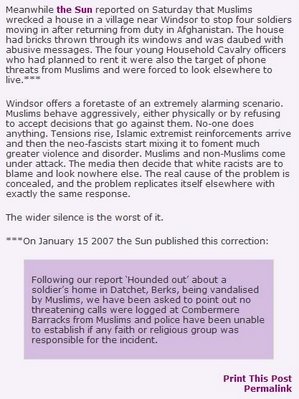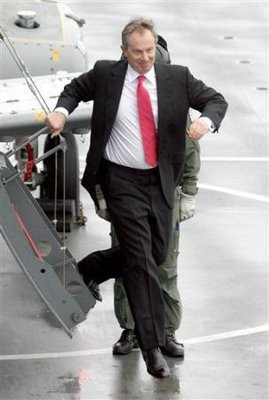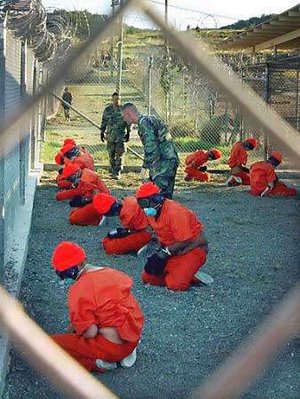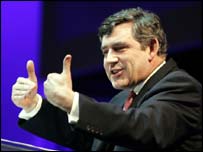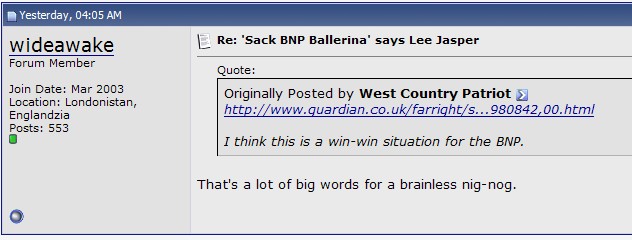As Blair enters the last lap of his premiership, a loss of authority was always to be expected. After ruling his party with as close to an iron fist as possible since the 1997 election, crushing dissent, fighting their natural instincts and promoting himself as the only one who could both reform the country and the party, the beginning to the year has seen his power finally begin to evaporate. While he was off-holidaying at the home of a Bee Gee, both John Prescott and Gordon Brown described the execution of Saddam Hussein, or at least the manner in which it was carried out, as "deplorable", necessitating Blair to say something similar once he eventually got round to it. Meanwhile, the army have been disgusted by his speech at HMS Albion, and now with the deputy leadership race more or less under way, other ministers and potential contenders have been opening their mouths in ways which would have earlier resulted in Alastair Campbell kicking their teeth in.
Normally, such apparent honesty would be welcome, as would the discussion which comes from the open talk of mistakes which have been made. The way some ministers have spoken out though only shows just how both opportune they are, how they don't know what they're talking about, and how they just simply don't get it. For instance, hark at James Purnell, who voted very strongly for the Iraq war:
"There are many, many lessons we need to learn about Iraq and it is very important for us politically to recognise that. In terms of international politics, we need to learn the lessons of the mistakes that clearly have been made."I think the biggest mistake is that you always need to learn the importance of moral legitimacy and international support. Going back and looking at what happened, if we and the Americans had realised that the Iraq did not have weapons of mass destruction as an imminent threat, we would have had more time to get a second UN resolution we were trying to get. If we had gone into Iraq with international support, the situation would have been much much easier.
No James, you berk, if the weapons inspectors had been allowed to finish their job properly, with "us and the Americans" realising that Iraq didn't have WMD as a result, there wouldn't have been a second resolution anyway because Iraq wasn't a threat to anyone, let alone us. Iraq was not, and would not have been in breach of UN resolutions; as Hans Blix pointed out in one of his final reports to the security council when Al-Samoud 2 missiles which slightly overshot their allowed distance were being dismantled:
We are not watching the breaking of toothpicks. Lethal weapons are being destroyed.
This is the real, overriding, dominant lesson that should be learned from the Iraq disaster. The war was simply not justified. We instead rushed to send in the troops, riding the coattails of an American administration which had almost universally destroyed opposition, both in Congress and in the wider country, enjoying the comfort of being propelled by a belligerent patriotism which had taken root since the attacks of the 11th of September. Despite throwing every single possible reason for going to war at the general public, it was only ever in the beginning phases that a majority supported the conflict in this country. Blair's dossiers, pleas about the humanitarian situation, accusations of links with al-Qaida which were given a cursory nod and a wink if not fully supported, all were linked in with the spin and lies which will now be remembered for years to come. After all this, rather than reflecting the entire conflict has been a mistake, that trying to convince the public with so much bullshit has now made the electorate even more cynical and disdainful towards politicians in general as a result, we're still being told by ministers that all would have been OK if only there had been international support. This isn't just hookum, it's flagrantly dishonest.
From the same article, Hilary Benn talks a decent amount of sense in contrast to Purnell, but still doesn't seem to acknowledge what now needs to be done:
"The current situation in Iraq is absolutely grim, so let us be clear about that truth. Look, the intelligence was wrong, the de-Ba'athification went too far, the disbanding of the army was wrong and, of course, we should have the humility to acknowledge those things, and to learn. I am not insensitive to the huge well of bitterness and anger from lots of people in the party."
Excellent. Someone from Labour who happens to be a minister who understands the reality of how things are. How though did Mr Benn vote on the recent Commons vote for setting up an inquiry? Uh, he rejected the need for one.
This is exactly what the problem is. It's all well and good to accept that things have gone wrong, that much is obvious. The difficulty Labour now has over Iraq is that it's stuck, forced to recognise that mistakes have been made, but still not yet willing to either apologise or order an inquiry along similar lines to the Franks inquiry, hopefully without the whitewash, or for instance, the Scott inquiry into arms to Iraq. Instead, highly influenced by Blair's repudiation that he was anything but completely honest in his case for war, Labour continues to defend the indefensible, and until he's gone, will probably continue to do so.
Not that this has stopped Peter Hain from opening his own campaign for the deputy leadership by launching a salvo against the Bush administration. In an interview with the New Statesman he said:
"The neo-con mission has failed ... It's not only failed to provide a coherent international policy, it's failed wherever it's been tried, and it's failed with the American electorate, who kicked it into touch last November. The problem for us as a government ... was actually to maintain a working relationship with what was the most rightwing American administration, if not ever, then in living memory."
Almost entirely right of course, although whether entirely kicking a working relationship with the Americans into touch or not is a good idea remains to be seen. Hain's problem is that he was in the cabinet in the run-up to the Iraq war, he's voted for the war, he's defended the war, and you've guessed it, voted against the inquiry into the war. Hain might have more credibility if he'd actually at least voiced concern about the Iraq war and Blair's foreign policy in cabinet, but there's no evidence that he has. Robin Cook's diaries of the time only seem to suggest that he and Clare Short even bothered to question the prime minister's line, with David Blunkett of all people being vexed to begin with as well. If, shock horror, you were cynical, you might think that Hain is only saying this now in an attempt to split the left-Labour vote between him and Jon Cruddas.
To be fair to Hain, he has been one of the more out-spoken members of the cabinet, but he has also often been seen as a sop to the soft-left of the party by Blair in an attempt to keep them in order. More encouragingly than his comments about foreign policy are his points about reengaging the unions, made in an article in the GMB union's journal.
Even this apparent dalliance with a return to more traditional Labour policies has already brought a riposte from Blair and his ultras. Their arguments, as ever, are completely self-defeating:
"You don't win elections from your comfort zone. You win them by showing courage and optimism."
Except that this "comfort zone" isn't a return to what the Blairite ultras are calling the 1980s, it's realising that New Labour policies have failed. Blair, in his bizarre, deluded way, seems to feel that every single policy he's ever put forward has been "progressive", that New Labour is "progressive". It isn't. Introducing top-up fees is not progressive, wasting billions of pounds in PFI schemes is not progressive, attaching ourselves without receiving anything discernible in return to the most right-wing American administration has not been progressive, and innumerable policies dictated from Downing Street in response to tabloid headlines have not been progressive. Being "New Labour" rather than considering principles, what actually works and being against everything that the party has held dear for decades has not been progressive, it's helped destroy the party and led to an increasingly cynical electorate. Even now, Blair is determined that this continues:
"It's not about merely accepting the aspirant class, tolerating the element that might vote conservative but we want to vote progressive; it's not about being gracious enough to allow their concerns on tax or immigration or responsive public services to intrude on our core cause.
"It's about a wholehearted embrace of them. It's not enough to be 'not against them'. We need to be for them, welcoming them, letting them shape and influence our policy. It means never relapsing into appealing to our heart detached from our head."
In other words, this is a retread of Liam Byrne and Bill Rammell's analysis that the next election will be based purely on appealing to the swing voters in a tiny number of constituencies. This is depressing beyond belief: it's the equivalent of the way the Tories "dog-whistle" nonsense of two years ago. It's giving over everything "we" believe in to the whims of those who will never be happy with their lot whoever's in government. Are their aspirations our aspirations? Are we meant to adjust to theirs rather than attempt to show why ours might be better for society as a whole rather than just them? This is Blair's influence on politics writ large: constantly trying to instantly respond to whichever the current crisis is, rather than seeing the bigger picture.
"The reason we have to be the ones taking on the challenge of terrorism, security, and the linked concerns over crime and immigration is because the people see the challenge clearly and want us to respond. If we fail to, if it's all too difficult, don't be surprised if they turn instead to the right."
Blair's boneheadedness really knows no bounds. Somehow he cannot see how his policies on security, terrorism and crime have been incredibly right-wing, or rather he does and doesn't want to own up to it. Labour's attempts to outflank the Tories on the right on crime have been successful in political terms, but have failed to solve the problems facing us or placate the tabloids. Crime has fallen but the prisons are full, and the only policy is to keep on building and keep on locking them away.
The Blairites then, continue not to get it. Even as the ship begins to sink, the rats, already up to their neck in it, continue to squeak that they can't swim away. No, that would be "comfortable".
Related posts:
BlairWatch: FAO Peter Hain | Rats Spotted Leaving Sinking Ship
Paul Linford - Hain rediscovers his balls
Ministry of Truth - The Human TouchLabels: Blair's legacy, clueless Blairites, Labour deputy leadership contest
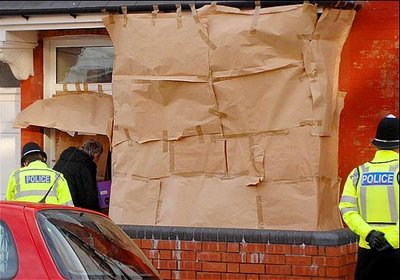 We were probably about due for another "terrorist" threat to emerge. As the Sun reminds us, every week when there isn't another 7/7 makes it all the more easier to forget about the "new realities" of the 21st century.
We were probably about due for another "terrorist" threat to emerge. As the Sun reminds us, every week when there isn't another 7/7 makes it all the more easier to forget about the "new realities" of the 21st century.
